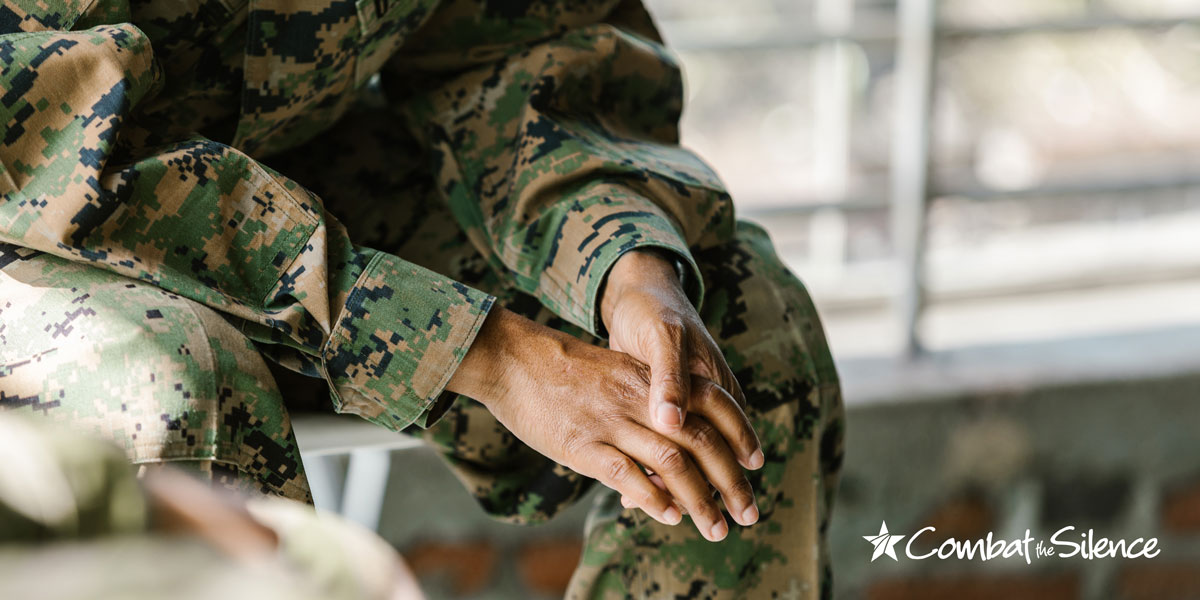Published: August 8, 2023

Written by Kali Hoffman
Our Veterans and service members shoulder a unique burden. The military service they render to our nation often exposes them to traumatic events that can indelibly mark their minds and lives. Recognizing the profound impacts of trauma on our military community forms a critical part of the Combat the Silence campaign led by Blue Star Families. We take a comprehensive look at how trauma shapes the brain, changes behavior, and why a trauma-informed approach is crucial in supporting our military families.
Trauma doesn’t discriminate when it comes to those who have served. From combat deployments to military sexual trauma to moral injury, the triggers are diverse and complicated, significantly impacting the mental health of our military personnel. Trauma is not merely a psychological concept but a “neuro-developmental insult,” radically altering the brain’s development and psychological processes. In essence, trauma rewrites the neural script, steering an individual’s thinking and actions towards uncharted territories.
These impacts of trauma on the brain can manifest in various ways. For example, it can lead to the disruption of self-regulatory processes like emotional regulation or the ability to maintain one’s regular routine. Trauma can also lead to destructive behaviors, such as isolation or substance use, which can put stress on individuals and their relationships. Physiological stressors can also rise due to the effects of trauma, including sleep disturbances and gut issues. Although trauma can impact a wide breadth of symptoms in individuals, it is important to know that the person who has experienced trauma is not at fault for the struggles they experience.
However, the impacts of trauma stretch beyond the immediate physiological changes. A person struggling with trauma might experience poor impulse control, difficulties in using good judgment, and challenges in regulating emotions. Memory retrieval, understanding consequences, initiating activities, or retaining information — all these cognitive functions can be significantly impaired. Even the simple act of narrating experiences in an organized, sequential manner can become a struggle. Again, the service member or Veteran is not at fault for having these experiences after they go through traumatic events.
A partner of Blue Star Families, and a leader in the trauma-informed care space, Stop Soldier Suicide offers six ways to help someone struggling with trauma:
- Learn their triggers.
- Provide reassurance of safety if someone shares their experience.
- Acknowledge they may be feeling powerless.
- Focus on their strengths.
- Offer space for them to share their feelings.
- Know the resources that exist.
It’s important to remember, though, that not everyone who has experienced trauma will grapple with the challenges discussed or with suicidal thoughts or behaviors. However, if you or a loved one has experienced or continues to experience these symptoms, please know that you are not alone and there are resources to support you.
As part of the Combat the Silence campaign, we are here to help you understand the trauma triggers, provide reassurance of safety, and acknowledge feelings of powerlessness that individuals often experience. Our Support Circles focus on harnessing strengths and offer a safe space for participants to share their experiences and resources.
Most importantly, we want to affirm that resources exist for those who need help recovering. Stop Soldier Suicide operates a 24/7 hotline at 844-503-0553 and the National Suicide Prevention Lifeline is available 24/7 via phone call or text at 988 (+1 for the Veteran’s Crisis Line).
In our collective commitment to Combat the Silence, we strive to bring to light the invisible wounds of trauma that many of our brave service members, Veterans, and their loved ones carry. Our mission is to ensure that everyone in our military family feels seen, heard, and supported in their battle against the hidden enemy within — the debilitating effects of trauma. We stand in solidarity with our military community, offering our unwavering support and resources to help them conquer this inner battlefield.
———-
Source: Stop Soldier Suicide. (n.d.). How Trauma Changes the Brain. Retrieved from [https://stopsoldiersuicide.org/braintrauma]
Posted In: Our Stories
